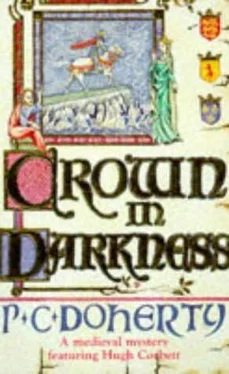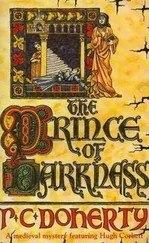Paul Doherty - Crown in Darkness
Здесь есть возможность читать онлайн «Paul Doherty - Crown in Darkness» весь текст электронной книги совершенно бесплатно (целиком полную версию без сокращений). В некоторых случаях можно слушать аудио, скачать через торрент в формате fb2 и присутствует краткое содержание. Жанр: Исторический детектив, на английском языке. Описание произведения, (предисловие) а так же отзывы посетителей доступны на портале библиотеки ЛибКат.
- Название:Crown in Darkness
- Автор:
- Жанр:
- Год:неизвестен
- ISBN:нет данных
- Рейтинг книги:4 / 5. Голосов: 1
-
Избранное:Добавить в избранное
- Отзывы:
-
Ваша оценка:
- 80
- 1
- 2
- 3
- 4
- 5
Crown in Darkness: краткое содержание, описание и аннотация
Предлагаем к чтению аннотацию, описание, краткое содержание или предисловие (зависит от того, что написал сам автор книги «Crown in Darkness»). Если вы не нашли необходимую информацию о книге — напишите в комментариях, мы постараемся отыскать её.
Crown in Darkness — читать онлайн бесплатно полную книгу (весь текст) целиком
Ниже представлен текст книги, разбитый по страницам. Система сохранения места последней прочитанной страницы, позволяет с удобством читать онлайн бесплатно книгу «Crown in Darkness», без необходимости каждый раз заново искать на чём Вы остановились. Поставьте закладку, и сможете в любой момент перейти на страницу, на которой закончили чтение.
Интервал:
Закладка:
NINE
The next morning the Prior brought a letter for Corbett; a simple note which said that Benstede had been attacked by unknown assailants the previous morning, that he was safe but advised Corbett to be most cautious. Corbett quietly vowed he would. He washed, dressed and took Ranulf down to the refectory for bread, cheese, a little ripe fruit and some watered wine. Afterwards, he ensured the men who had accompanied him to Scotland were well before sending Ranulf off to wash their clothes and busy himself about the abbey.
Corbett returned to his cell, carefully bolted the door and drew from a large leather pouch, parchment, pumice-stone, inkhorn, quill pens, a long thin razor-edged knife and a wad of red sealing-wax. He unrolled the parchment, scrubbed it with the pumice-stone and gently blew the fragments away, dipped his quill into the unclasped inkhorn and began to draft a letter to Burnell. It took hours and it was not until the late afternoon that he began the final copy.
'Hugh Corbett, clerk to Robert Burnell, Bishop of Bath and Wells, Chancellor, greetings. I have continued to stay at the Abbey of Holy Rood involved in the matter assigned to me. Let me first say that rumour and gossip abound, many shadows but so far very little substance. Common report now believes that Alexander III, King of Scotland, accidentally fell to his death from Kinghorn Ness on 18th March 1286. The King had convened a special meeting of the Council to discuss the imprisonment of a Galloway baron in England. The meeting was attended by the principal barons, both lay and ecclesiastic, of the kingdom. The King came in, sullen and withdrawn, but his mood changed rapidly. The business of the Council was soon dealt with and merged into general feasting when the King surprised everyone by announcing he intended to join the Queen at Kinghorn. Many remonstrated with him for a howling storm was raging outside, it was night and the journey was a dangerous one. The King brushed this opposition aside and left, taking two body squires with him, Patrick Seton and Thomas Erceldoun. They rode to Queensferry and persuaded the master boatman, against his better judgement, to ferry them across the Firth of Forth to Inverkeithing. They arrived safely and were met by the royal purveyor from Kinghorn (also called Alexander) who had brought horses down to the beach for the royal party; these included the King's favourite, a white mare called Tamesin which he had left at Kinghorn for the Queen's own use. The purveyor also attempted to reason with the King but to no avail. His Grace rode off. One of the grooms, Seton (a reputed lover of the King), knew the paths well and, in the darkness, somehow got far in advance of the King and so reached Kinghorn Manor. Erceldoun fared much worse. He could not control his horse which finally bolted so he and the royal purveyor stayed drinking in Inverkeithing. Meanwhile, King Alexander reached the top of Kinghorn Ness where both rider and horse toppled over the cliff to their deaths.
The next morning a search-party found the corpses on the sand below. The King's neck was broken, his face almost unrecognisable, his body a mass of bruises. The royal physician dressed the corpse for burial and it was interred eleven days later at Jedburgh. A Council of Regency was set up to supervise affairs: the Queen is pregnant and, if nothing comes of it, the Council will ensure that the crown of Scotland passes to Alexander Ill's granddaughter, Princess Margaret of Norway. However, there are others, notably the Bruces, who are more than prepared to advance their own claims to the throne. The real subject of my mission is the death of Alexander and certain conclusions can now be reached regarding it: Item – Alexander III was well-known for his mad galloping around the countryside in pursuit of some lady. There is no reason why he should treat a new bride any different.
Item – On the night of March 18th, there was a fierce storm; Alexander was not drunk but he had been drinking heavily. Moreover, he was riding a dangerous path. It may well be pointed out that he could have taken a safer route but this was not possible. Kinghorn is near the waters of the Forth, its most accessible route is the cliff-top track. The King could have ridden further inland, but he would have lost his way on the wild, grassy moorland which conceals marsh and bog to trap the unwary traveller. Consequently, Alexander followed the usual route, albeit in very dangerous circumstances. There may be a number of explanations for Alexander's death. Item – It was an accident. The King's horse, given all the conditions described above, could well have slipped and tumbled over the cliffs, taking his rider with him. Item – It may have been brought about by negligence. The purveyor, Alexander, is a drunkard. He could have resented being called out on such a dark, stormy night, not saddled the King's horse properly and this caused the accident on Kinghorn Ness. Yet, if this is so, why did the accident not happen earlier? And would such negligence have taken both horse and rider over the cliff's edge? Item – Did Alexander III die on Kinghorn Ness or was it some cunning stratagem of the King? Alexander III was known for his love of disguises, masques and jests. Did he arrange his mock death for some secret reason? I appreciate that this is a fantasy and there is no real proof for it. Moreover, the accident occurred over two months ago and no one has any reason to refute the obvious, that the King is dead and lies buried at Jedburgh Abbey. Item – King Alexander III was murdered by Person or Persons unknown though for what reasons, and by what means, are still a mystery. A number of unexplained factors make this a possibility.
Item – Why did the King leave Edinburgh on such a night just to be with his Queen? He could have waited till the morning. If it was lust, there were other ladies ready and willing. If it was love, why was Queen Yolande so calm and not grief-stricken by his death?
Item – The King arrived sullen to the Council meeting, convened for the most petty of reasons, then suddenly his mood changed, he became joyful, happy as a groom on his wedding night. What happened to cause this? Item – The most mysterious aspect of this is that there is no evidence that when the King came to the Council meeting he intended to leave but decided to do so there and then. However, messages had already been sent to Kinghorn instructing the purveyor to be on the beach with horses ready for the King, hours before the Council convened. Who sent these orders and how did they cross the Forth?
Finally, there are the prophecies of Alexander's imminent death which were circulating weeks before his death. What were the sources of these predictions? If it was murder (and I have slender evidence that it was) then, my Lord, let us remember Cicero's question – "Cui bono".? Who would profit from it? Bruce, bitter at the crown being taken from him in 1238? Resentful at Alexander and fearful that the King might beget an heir by his new queen and so lose for a second time the opportunity to advance the claims of his own house?
Yolande, his queen, who could not even be bothered to inspect her dead husband's corpse but keeps herself closeted at Kinghorn, claiming she is pregnant? She knew her husband was coming that evening but, when he failed to arrive, did not even bother to send out any search-party to look for him.
Patrick Seton, the King's squire and body-servant. He loved Alexander the King as a man loves a woman. He was jealous of Yolande and was the only person with the King when he died. I do wonder if the King's mad gallop through a storm-blown night finally unhinged his mind and so he caused the King's death and later died of a broken heart? I cannot understand why, after arriving at Kinghorn, he refused to wait up for his royal master and did not go looking for the King. Did he know his master was already dead?
Читать дальшеИнтервал:
Закладка:
Похожие книги на «Crown in Darkness»
Представляем Вашему вниманию похожие книги на «Crown in Darkness» списком для выбора. Мы отобрали схожую по названию и смыслу литературу в надежде предоставить читателям больше вариантов отыскать новые, интересные, ещё непрочитанные произведения.
Обсуждение, отзывы о книге «Crown in Darkness» и просто собственные мнения читателей. Оставьте ваши комментарии, напишите, что Вы думаете о произведении, его смысле или главных героях. Укажите что конкретно понравилось, а что нет, и почему Вы так считаете.












